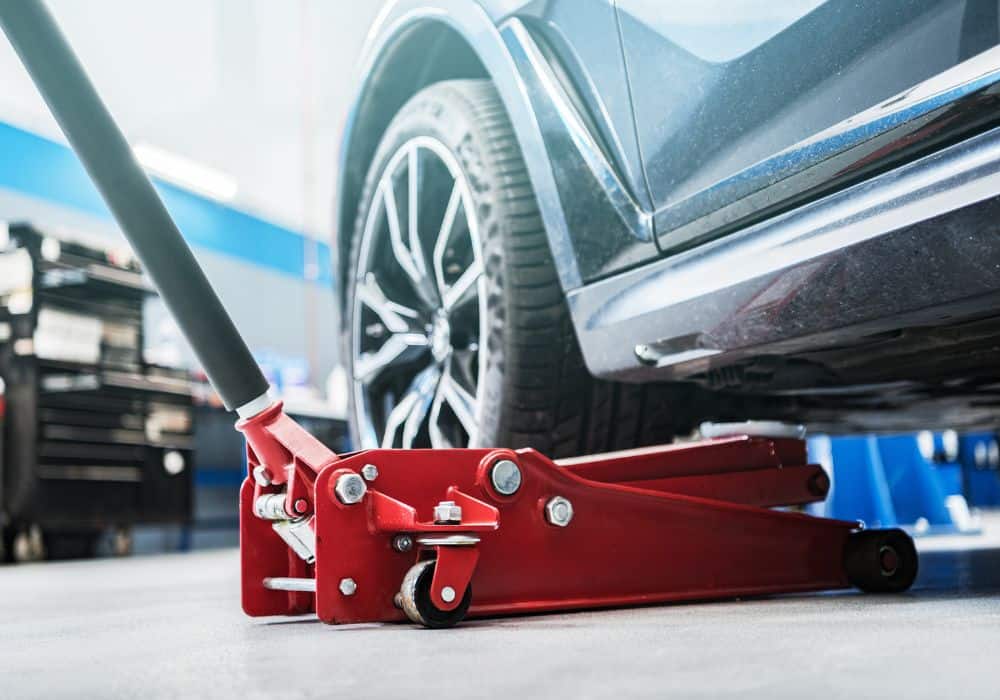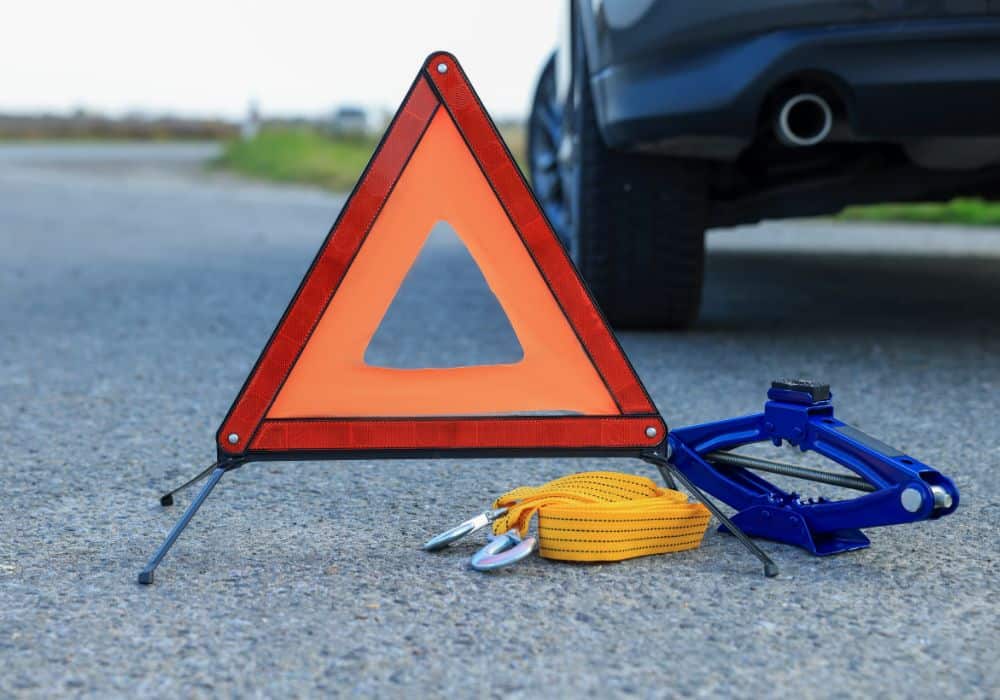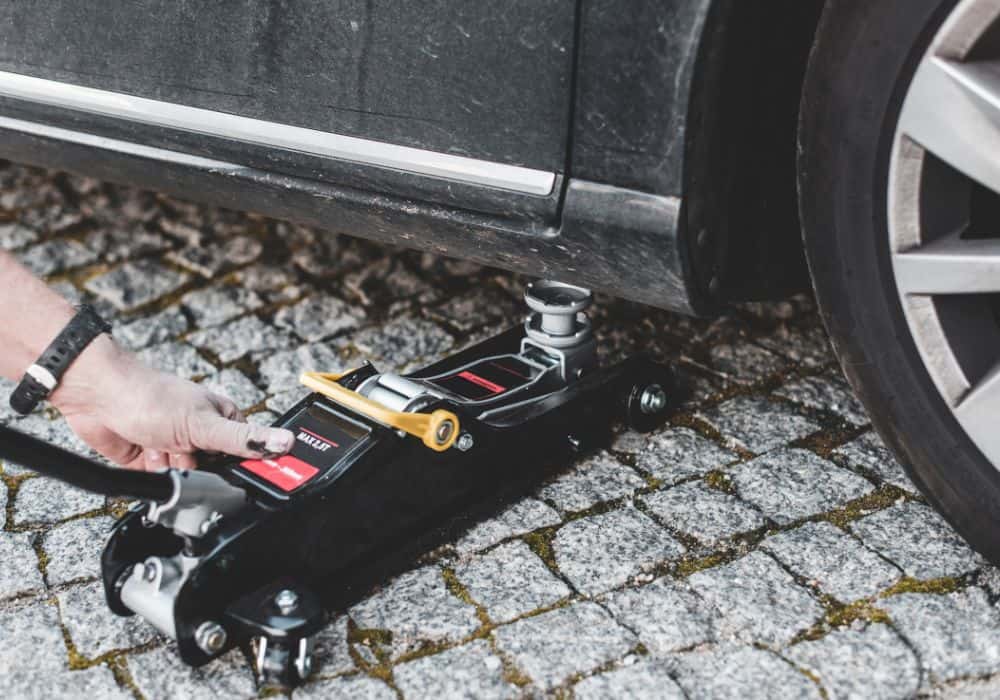Welcome to Floor Jack vs. Scissor Jack comparison. These two heavy-duty tools may look similar, but trust us; they’re as different as night and day.
So if you are tired of struggling whenever you need to change a tire, or a professional mechanic looking to upgrade your equipment, this article is for you. We’ll compare them and provide their pros and cons to help you decide which will work best for you.
Table of Contents
What is a Floor Jack?
A floor jack is a type of car jack or hydraulic jack. This mechanical device is designed to lift heavy loads between 1.5 to 5 tons or more, such as trucks, sedans, SUVs, and other vehicles, off the ground. Hydraulic floor jacks work using Pascal’s Law. It uses a combination of leverage and hydraulic pressure of two pistons to raise the load. This moves a crank connected to a lift pad, making it much easier and safer to work on the vehicle.
Floor jacks come in different sizes but all with the same basic parts, including the base, lifting arm, hydraulic pump, and release valve.
The jack base sits on the ground and helps keep it stable while in use. The lifting arm is connected to the base and is the part of the jack that is used to lift the load. The hydraulic pump creates the pressure needed to raise the load with the lifting arm. Lastly, the release valve is used to control the speed of the load as it is lowered back down.
Another type of hydraulic jack is the bottle jack. Both floor jacks and bottle jacks are vital equipment for anyone working on cars. They have a variety of applications, from simple tasks like changing tires or doing oil changes to more complex repairs like replacing suspension components or engines. Without a good floor jack, no garage or mechanic’s tool collection is complete.
Caution: Floor jacks can be dangerous if misused. Make sure you wear safety goggles and learn how to use the jack properly before trying it out! Always refer to the owner manual’s instructions.
Pros:
- can lift heavier vehicles
- stable and secure, and are less likely to tip over
- hydraulic mechanism is faster to use than a scissor jack
- can be used for many applications, including moving heavy objects or furniture for remodeling, repair, or construction.
Cons:
- takes up more storage space because it’s larger than a scissor jack
- more expensive than a scissor jack
- floor jacks are a great invention, but they’re not for everyone.
- not portable
- contains hydraulic fluid inside the cylinder, which may leak
What is a Scissor Jack?
A scissor jack, also known as a screw jack, is a smaller version of the floor jack. It’s a compact and portable device that allows you to lift your vehicle off the ground, making it easy to change a tire or perform other maintenance tasks.
At its core, a scissor jack comprises a series of diagonal metal plates connected to its diamond shape part by hinges. These plates are shaped like scissors, hence the name “scissor jack.” When you turn the spanner, the plates move together, lifting the vehicle off the ground.
Scissor jacks are known for their ease of use. To utilize one, position it under the designated lifting point on your vehicle and rotate the handle. Your vehicle should be on the flat surface of the scissor jack. In a matter of seconds, your car will be elevated enough to perform tasks such as changing a tire or performing maintenance. Once finished, simply turn the spanner in the opposite direction to lower the car back down.
Two types of scissor jacks are manual and electric scissor jacks used for tight spaces. They are typically smaller and more portable than other jacks and are perfect for use in garages or on the go. The biggest advantage of scissor jacks is that they are not just for changing tires. You can use it for a variety of tasks around your home or garage. It is also useful for lifting furniture, appliances, or anything that needs a little extra height.
So a scissor jack is a perfect choice if you’re looking for a versatile and easy-to-use tool to help you get your car off the ground. It’s a must-have for any car owner, and it’s small enough to store in your trunk with your spare tire, so you’ll always have it when you need it.
Caution: Always put your vehicle in first gear and turn up the brake before working with any type of car jack, so it doesn’t roll or fall.
Pros:
- safe to use
- compact and portable, easy to store and transport
- inexpensive
- easy to use as it requires only a manual crank to lift the vehicle
- can be used in a variety of conditions due to their lightweight design
Cons:
- smaller lifting capacity and can only lift lighter vehicles
- a manual crank is slower to use than a hydraulic jack
- less stable and secure; more likely to tip over
- may not be able to support the load if it is too heavy for its height
- only for changing tires
Floor Jack Vs. Scissor Jack (Cost & Features)
If you’ve ever been in a garage or workshop and needed to move something heavy, you’ve probably had to choose between two tools: floor jack and scissor jack. In order to assist in this decision-making process, it’s helpful to compare the two options.
1. Floor Jack vs. Scissor Jack: Cost
The cost of a floor jack and a scissor jack can vary depending on the brand, model, and features. However, a floor jack is typically more expensive than a scissor jack. A basic floor jack on Amazon can range from around $50 to $180, while a basic scissor jack can cost between $20 to $60. However, a high-end floor jack can cost over $380, while a high-end scissor jack can be around $160.
It is important to note that the cost doesn’t always reflect quality, durability, or performance. Therefore, it is always good to read reviews, check the warranty, and compare the features before making a purchase.
2. Floor Jack vs. Scissor Jack: Features
Floor Jacks and Scissor Jacks have different features that make them suitable for other purposes. Some of the key components to compare between the two include:
- Lifting Capacity: Floor jacks typically have a higher lifting capacity than scissor jacks, making them better suited for lifting heavier vehicles.
- Stability: Floor jacks are generally more stable and secure with a wider base and can distribute the vehicle’s weight more evenly. In contrast, a scissor jack has a smaller base, which is more likely to tip over.
- Adjustable Height: Many floor jacks have an adjustable height feature that allows you to lift the vehicle to a variety of heights, while scissor jacks only have one fixed height—typically can only lift one corner of a car to change tires.
- Speed: Floor jacks are faster to operate than scissor jacks. They use a hydraulic mechanism that is faster than a manual crank used in scissor jacks.
- Portability: Scissor jacks are generally more portable and can store in a trunk or under a seat than floor jacks as they are smaller in size and easy to store.
- Safety: Some floor jacks have built-in safety features such as overload protection, locking mechanisms, and dual-pump design that can prevent accidents during the lifting process. Just make sure to follow safety tips when using this tool.
- Accessories: Some floor jacks come with additional accessories such as wheel chocks, carrying cases, and handle extensions that can make the use safer, more convenient, and more stable.
FAQs
Q1: How do I choose between a scissor jack and a floor jack?
The best way to choose between a scissor jack and a floor jack is to consider the weight you need to lift and how often you’ll need to move the jack. If you only need to raise a large load occasionally, a floor jack is the better option. However, if you frequently need to move the jack around, a scissor jack is the better choice.
Q2: How do I maintain my scissor jack/floor jack?
To maintain your scissor jack/floor jack, keep it clean, lubricated with grease or oil, and store it in a dry place when not in use. Also, periodically check for any signs of wear or damage and to replace any broken parts.
Conclusion
In summary, floor jacks and scissor jacks have their advantages and disadvantages. Floor jacks are more suitable for heavy vehicles and professional settings, as they have a higher lifting capacity, more stability, and adjustable height. Scissor jacks, on the other hand, are more portable and easy to store. They’re more suitable for personal use and as a temporary solution for changing a tire.
It’s important to consider your specific needs and preferences before making a purchase. Take into account your vehicle’s weight, the amount of space you have for storage, and how often you will be using the jack, so you can make the best decision for your specific needs.


